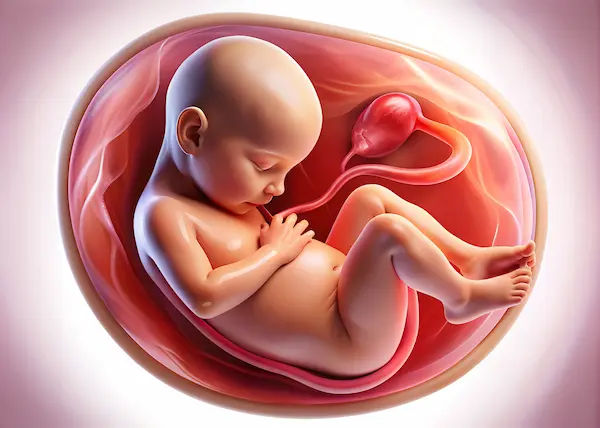Increasing Women's Fertility Naturally: A Comprehensive Guide
Learn how to increase women’s fertility naturally. Discover special diet plans, other lifestyle modifications and essential tips to ensure a healthy pregnancy for you.

Written by Dr. Sonia Bhatt
Last updated on 3rd Jul, 2025

Introduction
Fertility is a complex and enormously personal journey for many women. Whether you're just beginning to think about starting a family or have been trying for some time, you may want to explore ways to increase your chances of conception. Fortunately, numerous natural methods and lifestyle changes can improve fertility, support reproductive health, and optimise the chances of a healthy pregnancy.
Understanding Fertility and How to increase it
Women are born with a finite number of eggs, and as they age, the number and quality of these eggs naturally decline. Ovulation—the release of an egg from the ovary—is a key event in the fertility cycle. For conception to occur, sperm must fertilise the egg. If the egg is not fertilised, it is expelled during menstruation. Several factors can impact fertility, including age, hormonal imbalances, lifestyle factors, and underlying health conditions. Making positive changes to your lifestyle and habits can often improve fertility.
1. Maintain a Balanced and Fertility-Boosting Diet
Your diet plays a significant role in reproductive health. A well-balanced, nutrient-rich diet helps in hormone regulation and enhances egg quality. This can help improve fertility. Here are some dietary adjustments that can support your fertility naturally:
a. Focus on Whole, Nutrient-Rich Foods
Eating a variety of whole foods can provide essential nutrients that support healthy reproductive function. Aim to consume plenty of:
Fruits and Vegetables: Rich in antioxidants, vitamins, and minerals that protect eggs from oxidative stress and support overall fertility. Include leafy greens, berries, citrus fruits, and carrots.
Whole Grains: Foods like oats, quinoa, and brown rice are high in fibre and provide steady energy to support hormonal balance.
Healthy Fats: Omega-3 fatty acids found in fatty fish like salmon, flaxseeds, and walnuts are crucial for hormone production and egg quality.
b. Reduce Refined Carbohydrates and Sugary Foods
Excessive sugar and refined carbohydrates can cause insulin resistance, leading to hormonal imbalances. Instead of processed sugars, use complex carbohydrates like sweet potatoes and whole grains.
c. Opt for Protein Sources with High Nutritional Value
Rather than relying on red meat, focus on plant-based proteins like beans, lentils, and tofu, as well as lean meats like chicken or turkey. These provide key nutrients, including zinc and iron, vital for reproductive health.
d. Don’t Forget Hydration
Staying hydrated is crucial for overall health and fertility. Aim to drink at least eight cups of water daily. Proper hydration helps maintain optimal cervical mucus, which is vital for sperm movement.
2. Foods and Supplements That Increase Fertility
Certain foods are particularly effective in supporting reproductive health. Incorporating these into your diet and appropriate supplements can enhance fertility.
Foods to Boost Fertility
a. Leafy Greens and Cruciferous Vegetables: Vegetables such as spinach, kale, and broccoli are rich in folate, a vital nutrient for fertility. Folate supports egg development and cell division, both crucial for pregnancy. Broccoli and cauliflower also provide fibre and antioxidants that help reduce inflammation and support hormonal balance.
b. Berries and Antioxidant-Rich Fruits: Berries such as blueberries and strawberries are packed with antioxidants that protect eggs from damage. These antioxidants can help improve egg quality, which is essential for healthy conception.
c. Oily Fish (Salmon, Sardines, Mackerel): Fatty fish are rich in omega-3 fatty acids, essential for hormone production and egg quality. Omega-3s also reduce inflammation and improve blood flow to reproductive organs, which may increase fertility.
d. Avocados: Avocados are high in healthy fats, folate, and vitamin E, all of which support fertility. The monounsaturated fats in avocados also help regulate insulin levels, making them especially beneficial for women with conditions like PCOS.
e. Nuts and Seeds: Nuts (e.g., almonds and walnuts) and seeds (e.g., flaxseeds, and chia seeds) are packed with healthy fats, zinc, and magnesium, which help balance hormones, improve egg quality, and support overall reproductive health.
f. Whole Grains: Whole grains, such as quinoa, brown rice, and oats, provide complex carbohydrates and fibre, helping to regulate blood sugar and support hormone balance.
g. Beans and Lentils: Beans and lentils are rich in plant-based protein, fibre, and iron. They also contain folate, which is essential for early pregnancy and fertility.
Supplements to Support Fertility
In addition to eating a fertility-boosting diet, some food supplements can be used to enhance reproductive health. Following are some key supplements that support fertility:
a. Folate (Folic Acid): Folate is crucial for women trying to conceive. It helps with cell division and is essential for the baby's early development. To support fertility, women should take at least 400-800 micrograms of folic acid daily when planning a pregnancy.
b. Coenzyme Q10 (CoQ10) CoQ10 is an antioxidant that supports energy production in cells, including egg cells. It has been shown to improve egg quality, particularly in women over 35, by reducing oxidative damage and supporting mitochondrial function.
c. Vitamin D Vitamin D insufficiency is associated with reduced fertility. Ensuring adequate levels of vitamin D can improve reproductive function and support hormonal balance.
d. Zinc Zinc plays a vital role in hormone production, ovulation, and egg maturation. It’s essential for fertility, and deficiency can impair these processes. Good sources of zinc include oysters, pumpkin seeds, and beans.
e. Omega-3 Fatty Acids Omega-3 fatty acids, particularly DHA and EPA, help reduce inflammation, improve blood flow to reproductive organs, and support healthy egg development. Omega-3 supplements are especially beneficial for women trying to conceive.
f. Myo-Inositol Myo-inositol helps regulate insulin and supports ovarian function. It is particularly beneficial for women with PCOS, as it can improve ovulation, hormonal balance, and egg quality.
g. L-arginine L-arginine is an amino acid that can help improve blood flow to the reproductive organs, supporting egg health and ovarian function. Some studies suggest it may enhance fertility in women.
3. Exercise Regularly but Don't Overdo It
Exercise is important for keeping your body healthy and supporting fertility. However, too much intense exercise can disrupt your hormones and affect your ability to get pregnant. Strenuous workouts can mess with your menstrual cycle and ovulation.
a. Moderate Exercise
Activities like walking, swimming, or yoga are great for your health. These moderate exercises help you maintain a healthy weight, balance your hormones, and lower stress—all of which are good for fertility.
b. Maintain a Healthy Weight
Being either too heavy or too light can interfere with ovulation and make it harder to get pregnant. Keeping your weight within a healthy range helps keep your hormones balanced and increases your chances of conceiving.
4. Manage Stress
Stress can mess with your hormone levels, which affects ovulation. Taking steps to relax and reduce stress can help your body produce the hormones needed for regular periods and fertility.
a. Practice Relaxation Techniques
Mindfulness practices like meditation, deep breathing, and gentle stretching can help lower stress levels and improve your chances of getting pregnant.
b. Do Things You Enjoy
Find activities that help you relax, like reading, crafting, or spending time with family and friends. Doing things you love can help calm your mind and improve your emotional well-being.
5. Get Enough Sleep
Sleep is key to keeping your hormones in check. If you don’t get enough sleep, it can throw off the hormones that help with ovulation. Aim for 7-8 hours of good sleep each night to support your fertility.
6. Quit Smoking and Limit Alcohol
Smoking and drinking too much alcohol can hurt your fertility. Smoking can damage your fallopian tubes and ovaries, and it can affect the quality of your eggs. Alcohol messes with hormone production and can mess up your menstrual cycle.
7. Consider Acupuncture or Herbal Remedies
Some women find acupuncture helpful for boosting fertility. There are also certain herbs, like chaste tree berry (Vitex), that are believed to help balance hormones and encourage regular ovulation.
8. Be Aware of Environmental Factors
Try to avoid exposure to harmful chemicals or toxins that could affect your fertility. Using natural, non-toxic products and switching to glass or stainless steel containers instead of plastic can help reduce your exposure.
Conclusion
To improve fertility naturally, it's important to make positive modifications to your diet, exercise, and lifestyle. Eating nutrient-rich foods, managing stress, getting adequate sleep, and avoiding unhealthy habits like smoking and excessive drinking can all enhance reproductive health. Supplements such as folate, omega-3s, and CoQ10 can further support fertility. By following these simple steps, you can increase your chances of conception while taking care of your overall health.
Consult Top Obstetrician-Gynecologists
Consult Top Obstetrician-Gynecologists

Dr. Swati Shah
Surgical Oncologist
15 Years • DNB Surgical Oncology, certified Robotic Cancer Surgeon
Ahmedabad
Apollo Hospitals Gandhinagar, Ahmedabad
(25+ Patients)

Dr. Nilanjana Das
Obstetrician and Gynaecologist
5 Years • MS (O&G)
Guwahati
Apollo Personalized Health Check Centre, Guwahati

Dr. Sushma Prasad Sinha
Obstetrician and Gynaecologist
35 Years • MBBS, MD, MRCOG., FRCOG., FICOG, FIMSA
Delhi
Apollo Hospitals Indraprastha, Delhi
(25+ Patients)

Dr. Vidya Konduri
Obstetrician and Gynaecologist
9 Years • MS
Chinagadila
Apollo Hospitals Health City Unit, Chinagadila
(25+ Patients)

Dr. Madhu Roy
Obstetrician and Gynaecologist
30 Years • MBBS, MD
Delhi
Apollo Hospitals Indraprastha, Delhi




